SCOTUS handed down a 6-3 opinion in the murthy v missouri case about internet and media censorship by proxy. the federal government and agencies were pressuring social media companies to suppress content and speakers and to deplatform (and even decatform) those with whom it disagreed. the state’s track record of being wrong on virtually every example and purveying the very disinformation it professed to seek to stifle speaks for itself. this seemed like it ought be a clear cut matter. but the ruling did not go our way.
i have not read it all yet nor have i read the (by many popular accounts) blistering dissent by alito, thomas, and gorsuch but as this is near and dear to many of team toxo’s hearts and to many gatopals™ like jay who were actual plaintiffs here, i’d like to lay out some thoughts so far.
the case was not decided on merits but rather the technicality of “standing” arguing, in essence, that those bringing suit had no basis for asking that the government be enjoined from censoring them and or/advocating for such because they could not prove a direct link to any injury.
this is a dire and dangerous standard and a craven one to boot.
this is a cowardly choice by SCOTUS to punt on a technicality rather than rule on the state engaging in censorship by proxy through the co-opting or intimidation of media and social media companies.
there is no just basis for allowing the state, through cut outs like universities, non-profits, or private companies, to advocate or demand actions that would be clearly unconstitutional if the state itself engaged in them directly.
this is the speech equivalent of the president hiring the pinkertons to capture and detain political opponents without due process and this ruling would imply that you’d have no standing to seek injunction against such actions.
the legal reasoning looks tortured and facile and strikes me as a grave disappointment.
let’s look:
justice amy coney barrett (ACB), who appears to be confirming the fears that she was a lackluster and shallow legal mind, plays the safety karen in opposition to basic constitutional sense and application, writing for the majority states:
“To establish standing, the plaintiffs must demonstrate a substantial risk that, in the near future, they will suffer an injury that is traceable to a Government defendant and redressable by the injunction they seek. No plaintiff has carried that burden.”
this seems an absurd miss. the loss of a speech right is a clear injury and when government is coercing media entities to abridge such rights, they act as a government proxy. there was nothing remotely vague or uncertain about what was going on. government actors and agencies had literal lists of people (and cats) to be suppressed and went to twitter and facebook and others and said “take this down.” they did it on health data. they did it on facts (like the hunter laptop) that were clearly relevant to an impending election. these are injuries. and it’s hopelessly unconstitutional no matter how many proxies and cutouts are used.
this is an outright defense of “jimmie the brick” admiring your store window and “what a shame it would be if something happened to it” and then telling you what not to sell in your store to avoid such a nasty outcome.
certain internet felines spoke on this in the past. is this really any different?
alito speaks directly to this in his dissent
he calls out the now near certain future mischief to come from just such actions and the new and greater efficacy they shall carry as the social media companies now know in no uncertain terms that brick threats to induce the purchase of window insurance are now A-OK for leviathan.
hardly a soothing state of affairs.
the government is not like other actors and the sorts of standards one uses in a case of one private actor against another are inapt. and this is where ACB’s logic really starts to fail:
“The plaintiffs assert injuries based on the restrictions that countless other social-media users have experienced. This theory is startlingly broad, as it would grant all social-media users the right to sue over someone else’s censorship—at least so long as they claim an interest in that person’s speech.”
yes. exactly. because the government is not like other actors and when they take your rights, it hurts me as well. it hurts us all. every precedent, every action, every transformation of an inalienable right into a privilege to be revoked by fiat hurts us all. the elimination of the idea of rights impoverishes everyone in untold and uncountable ways.
this is WHY our framers framed the bill of rights as they did. the point is that abridging the rights of anyone harms the polity of we the people as a whole.
if i may silence him, then you too may soon come in your turn. that is a a loss to you.
this is why it’s constitutionally proscribed.
los federales did what they exactly to avoid this: (released under FOIA. nick clegg is facebook parent co “meta” head of global affairs. vivek is US surgeon general (named in the case
if this is not targeted suppression at government urging, i’d love to see what is. and when the same state and executive branch that can yank your legal protections and licenses to operate say stuff like this, it’s awfully hard not to listen, especially once you’ve seen the kinds of bricks they have piled up for windows just like yours and their “for my friends, everyhting, for my enemies, the law” tendencies are so proudly and prominently displayed.
and having SCOUTUS sanction will make this twice as bad and thrice as blatant.
ACB then tries to wiggle off the hook with what, to my mind, is a real weaksauce dodge:
“the record reflects that the Government defendants played a role in at least some” of the moderation choices, but contended that the “platforms had independent incentives” as well.”
leaving aside her failure to even ask about the incentives and intentions of the state here, more than any other matter at hand, media co “incentives” had to do with “keeping their section 230 rights” and the idea that “well, sure there was some pressure/coercion, but they had other reasons too!” is a desperately facile dodge that essentially requires impossible and therefore always subjective and self-serving mind reading as to just why facebook and twitter did what they did.
“well, the media companies might have done it anyway” is a truly absurd standard by which to assess the harm of governments throwing their weight around.
it’s also quite perfectly self refuting.
consider:
if a company were going to perform action A anyway, then it needed no urging from the state to do so. so you get action A.
it is ONLY if the company would not have done this on its own that such state urging matters.
but if it is that urging that carries the day and sways an otherwise unwilling actor to engage in A where otherwise it might have done B or done nothing, then clearly, that urging/coercion was the precipitating event and is just the think she seeks to claim it might not be.
so there is no case of the world in which allowing such urging could be just or constitutional.
she’s really painted herself into a corner on this one. the only real world case in which the standards she sets would be constitutional is a case in which they were not needed, a case where the government demands A of a private actor that was going to do A anyway.
and if the only case in which such action is legal is a case in which it is not needful, then why on earth allow such power to accrue? what good purpose could this serve? it can only even be legally wielded where is is not required and now we have entered into a vast wilderness of the protection racketeers and the victims alike making pretense that everyone is OK with this and because somehow the threat of “do as we urge or consequences” is too vague to be treated as credible or linked.
this is not how you behave with the state. against a private actor, sure, the standard for the proof of harm may properly be higher, but from a state whose constitutional foundation guarantees you negative rights to not be interfered with, the matter is quite different and when the state is taking clear actions to influence who is allowed to speak and about what, it simply beggars credulity to insert this presumption of innocence and ascribe to the private companies so intimidated some likely chance that they’d have done it anyway as a “reasonable doubt” for the fact of the matter is that there can be no doubt.
if the state’s urging is only relevant when it would change a private actor’s behavior but only legal when that actor would have anyway done what the state advocated, there is simply no just or reasonable basis for allowing such urging and speech.
and for ACB to miss this fundamental contradiction rooted in the fundamental difference between the state as an actor and private actors is hopelessly embarrassing and deeply dangerous.
the standard it erects against enjoining the behavior of the government will allow and enable all manner of outrage and the timing mismatch of “we can do it, you cannot get an injunction against it because you lack standing, and at best, see you in a couple years” means that many such cases will be long past relevance by the time they can be heard.
in matters of timeliness such as an election or a vaccine mandate to be allowed to work, if error is to occur, it should err on the side of protecting people from compulsion, not “go ahead and force them while we wait to figure out if it’s OK.” that is the standard of a tyrant, not of a republic.
republics look like this:
Amendment I
Congress shall make no law respecting an establishment of religion, or prohibiting the free exercise thereof; or abridging the freedom of speech, or of the press; or the right of the people peaceably to assemble, and to petition the Government for a redress of grievances.
but the problem is that constitutions are “parchment promises.” former justice scalia (who would be raging about this travesty) lays this distinction out eloquently:
it remind me a bit of certain internet felines who have been hear to opine that “you get to keep the rights you fight for and not a single bit more.”
at the end of the day, paper prerogative counts for a little and a constitution written such that ethical people may, by consent, govern ethical people starts to fail and even invert in the hand of the unethical.
a document cannot save us from the government that societal rot enables and encourages. this is all downstream of us and it will not get better until we get better. and on such matters, you all know my judgement:




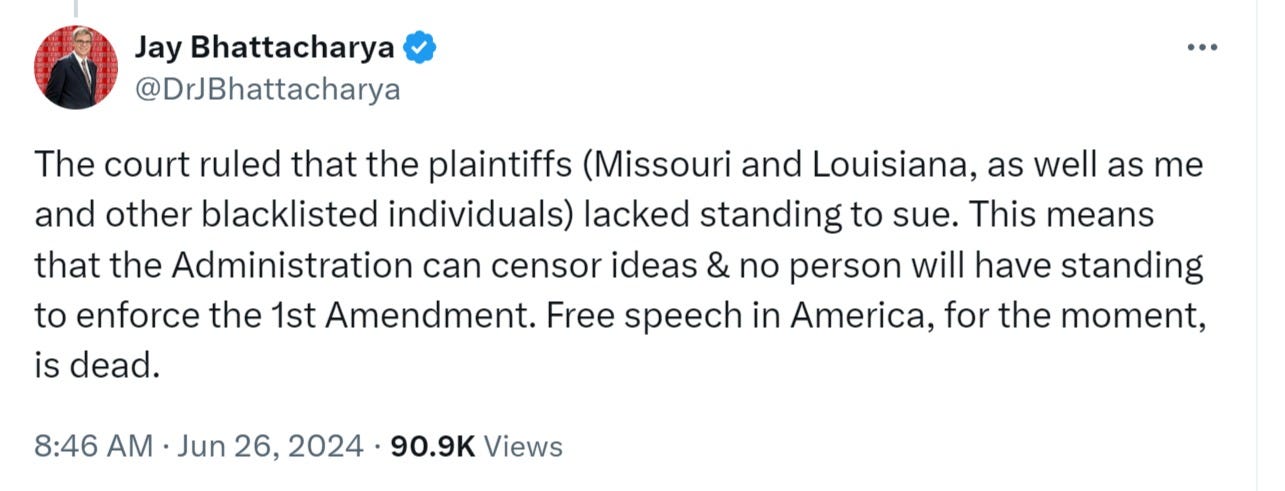

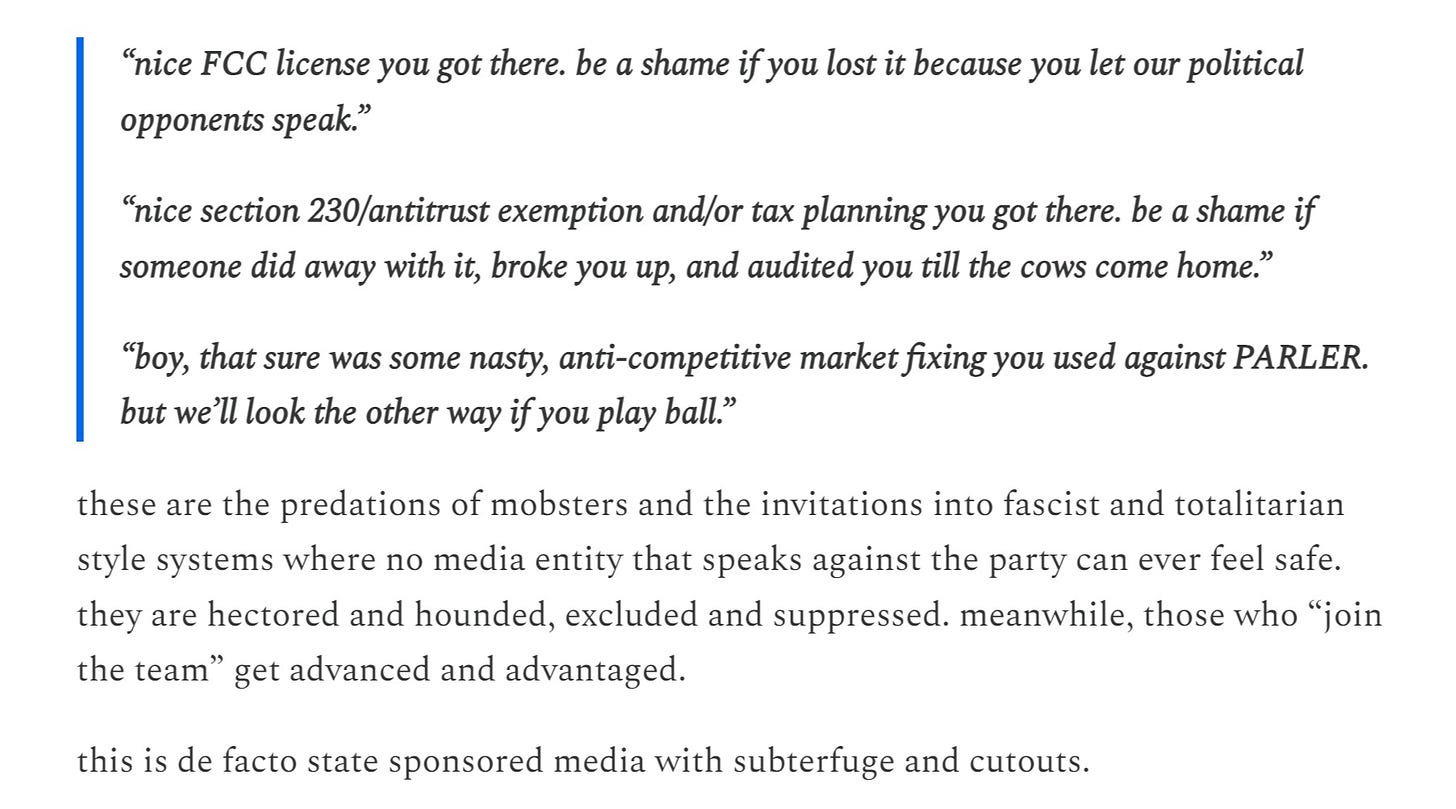
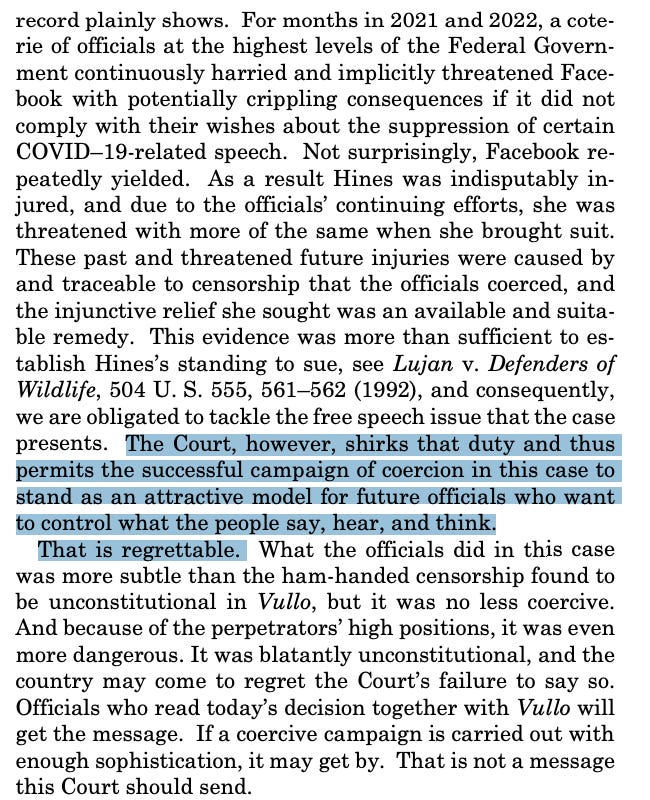
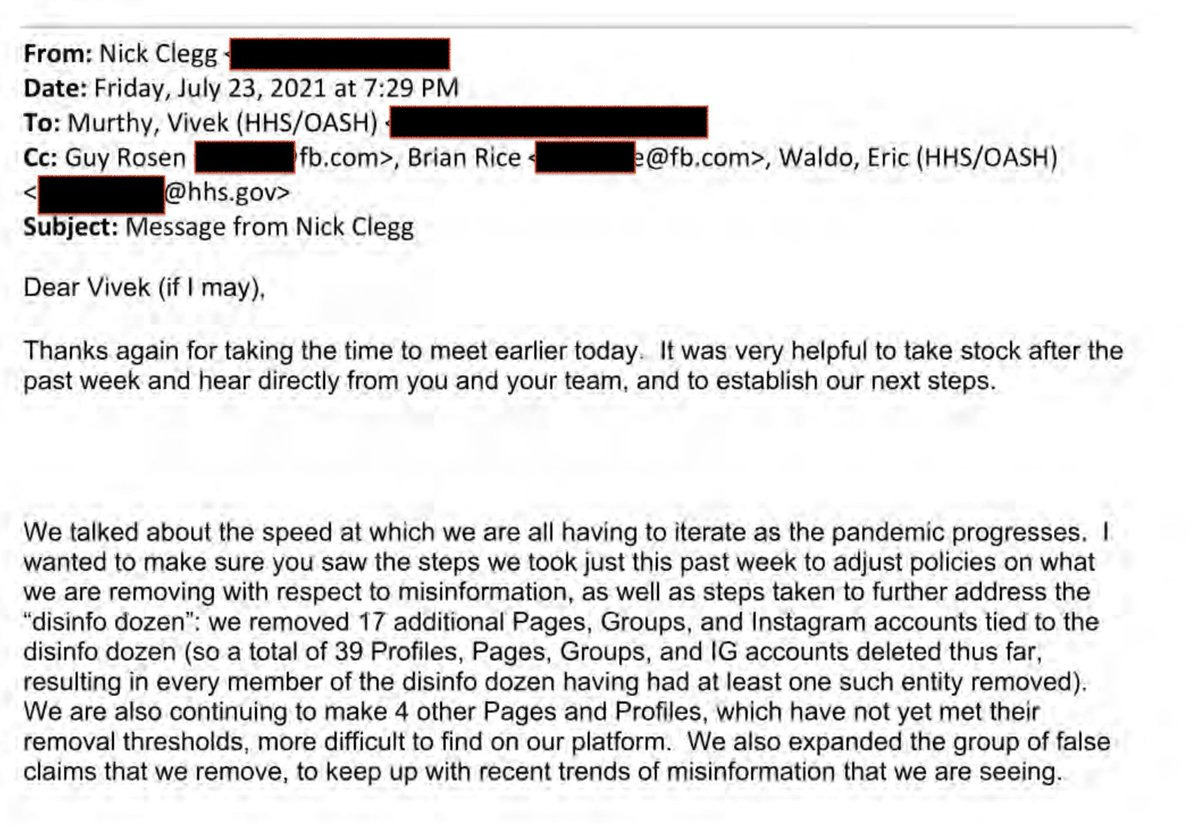
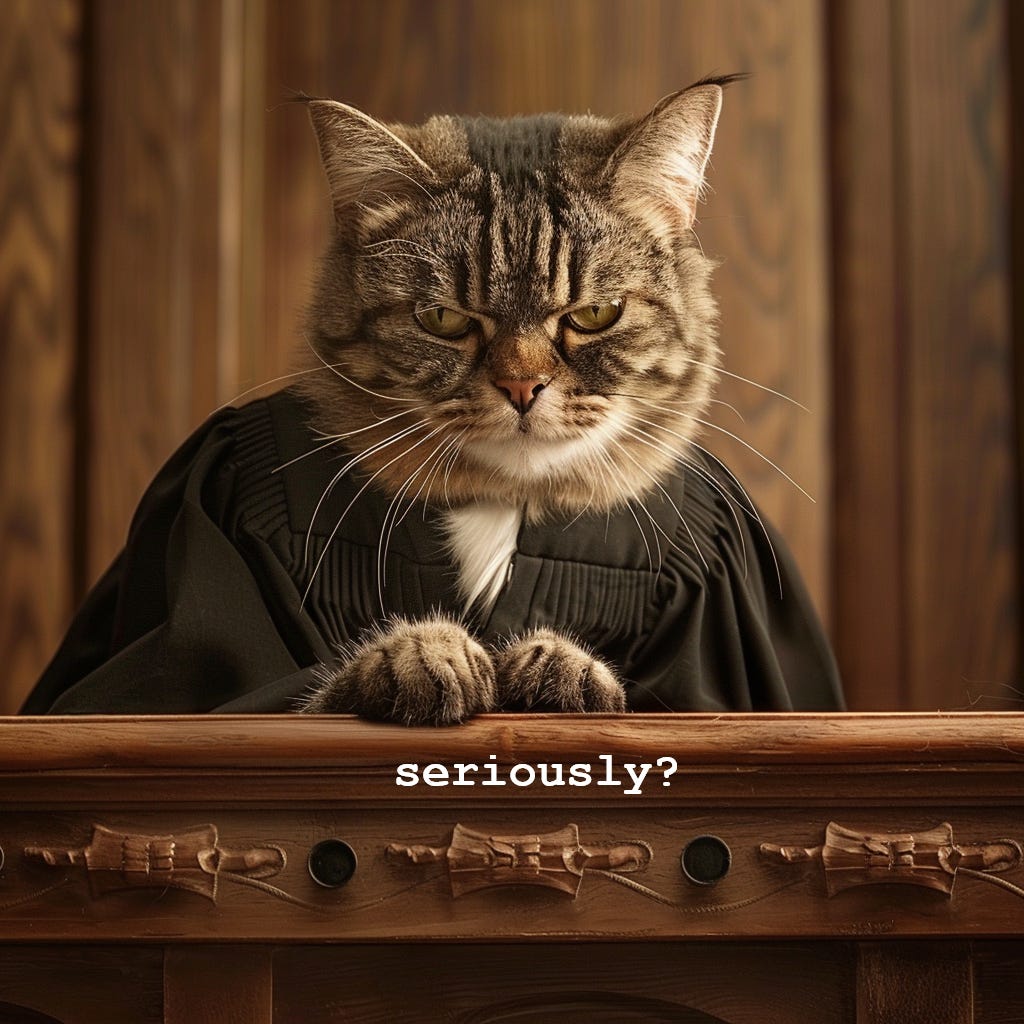
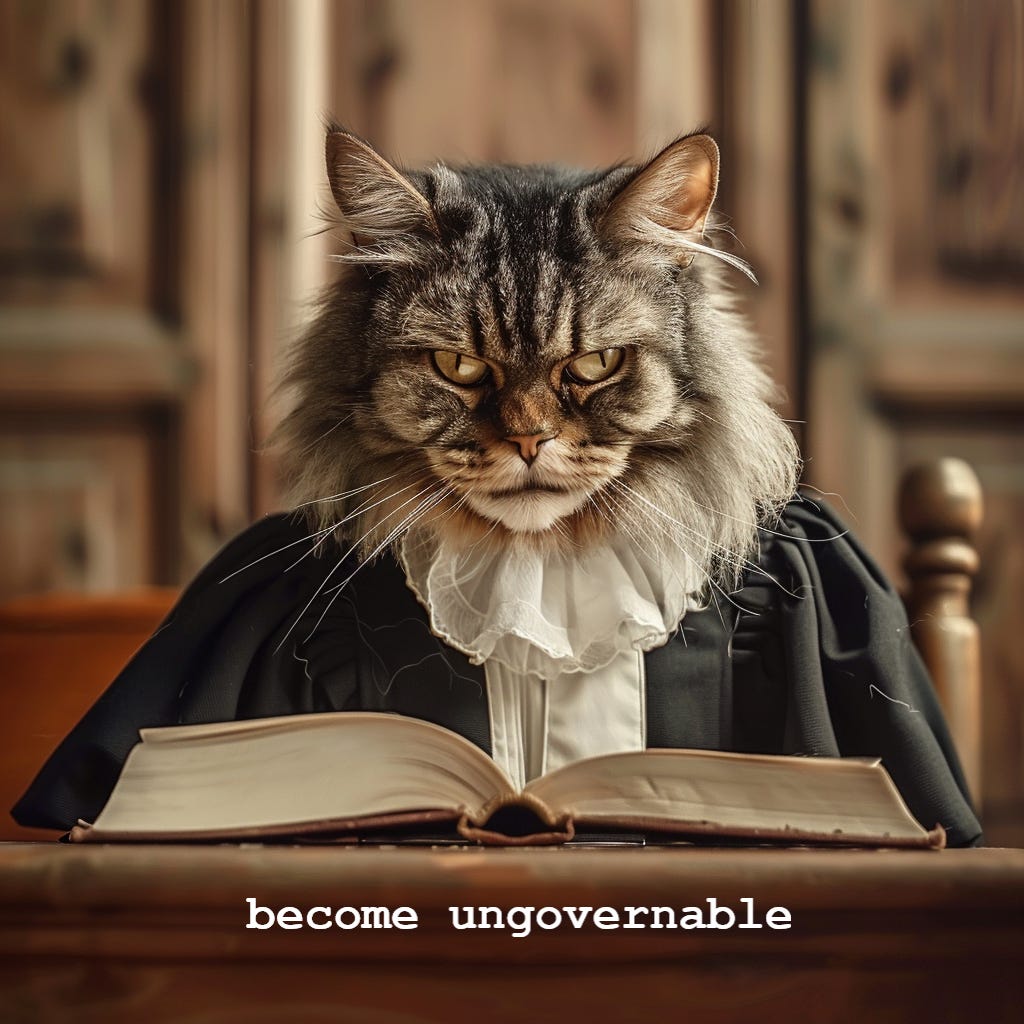
All the Trump sycophants are complaining, yet Trump's appointees, Kavanaugh and Barrett sided with the 4 nut jobs on the court. I'm voting Trump, but does anyone really think Trump is going to change any of this crap moving forward? Our choices for President are literally a douche and a turd sandwich again.
Alex Berenson was looking for verdict against the govt to fortify his case.
Since the majority punted on the subject of standing, that makes Berenson's case the tip of the spear on this issue, and there's no way ANY of the Supes can say he lacks standing.
Plus, he can show actual damages. That case is now the one for everyone to get behind, otherwise leviathan runs amuck.